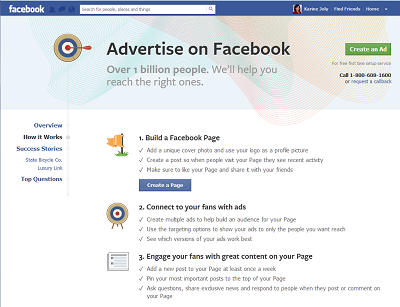My latest University Business column is now available in the November issue as well as online: “The New Digital Advertising Order: Using online advertising to reach target audiences”
This column is a primer about the new trends at work in digital advertising, a primer that can help you explain this new digital order to decision makers.
There’s been a lot of talk about social media advertising these past few weeks in the higher ed community.
The reason?
Another more drastic change in Facebook Edgerank (the algorithm determining which of your page posts (if any) will make it to your fans newsfeed) that was implemented a few weeks ago.
As I explained in my article, Facebook now wants to make sure you’ll buy sponsored stories or other social ad products, because that’s what will make its shareholders happy.
In this context, ads are the way to go to get your message across – at least for Facebook :-). Or, as I tried to put it Wednesday in 140 characters:
@agossen oh, I'm sure you got great results with FB advertising – they made the free way worst, so the paid way looks really great @markgr
— Karine Joly (@karinejoly) October 31, 2012
This week, we are also focusing on social media advertising in my 8-week online course on social media marketing for higher ed. So, my students (professionals like you working in universities and colleges around the country) have been asked if it makes sense to pay to play on social media platforms, discussing the benefits and risks of social media advertising.
Want to hear something funny?
The “right” answer for this specific class discussion has changed over the past few months. Not even a year ago, my recommendation to students was to shy away from ads (or maybe play a bit with a very small budget) and work harder publishing more engaging content.
Today, you don’t really have a choice anymore.
 Despite what Facebook would like us to think, your FB audience is as much rented as the audience you rented from TV networks, newspaper or magazine publishers when you made traditional ad buys.
Despite what Facebook would like us to think, your FB audience is as much rented as the audience you rented from TV networks, newspaper or magazine publishers when you made traditional ad buys.
With one exception though: you’ve worked very hard to build this targeted Facebook audience.
And, it’s perfect for your institution. That’s why this tactic is still more powerful than others thanks to the engaging nature and smart reach of Facebook.
But, we all need to remember that Facebook can change the rules whenever it makes sense for its bottom line. Facebook has always been a for-profit company. So, it follows the… money!
Right before and after Facebook went public, there was a lot of talk on the fact that its ads didn’t work as well as other type of digital ads.
This probably explains why Facebook made sure in its recent algorithm change that ads work much better than any free updates you post.
Down the line, it means that you will have to use your credit card to keep up playing there.
The time of the free lunch on social media is indeed over.
- Has your institution started to pay to play?
- If you’re advertising on Facebook, what are your goals?
- Does it make sense to even develop your Facebook audience when you don’t know how much it will cost you in the future to stay in touch with it?
Let’s talk about this!




We haven’t yet bothered with pay to play. The pay to play philosophy doesn’t make much sense to me, as far as Facebook goes. Our FB page is largely a campus/community enthusiasm builder.
When we succeed, that’s great and we celebrate that… but there’s not some resulting influx of revenue to offset the new costs of using FB. In the end, it becomes an expensive way to communicate the types of things that a campus community responds to socially (e.g. bragging points, sports victories, individual accomplishments, etc.).
At Oregon Culinary Institute (a for-profit school), we were early users of Facebook pages and quick to hop on the Facebook ads train because our community is so active on our FB site. Touting our FB presence and online community was a no-brainer in the landscape of competing against massive corporate-owned culinary chain schools. But you shouldn’t dive into FB ads thinking that it is part of a lead generating strategy. You need compelling content (photos and video are key, of course) and the ability to compose an engaging narrative that will draw people (read: prospective students) in and compel them to research your school as a viable option for his/her future.
We tried FB ads for a “Department Day” – an open house for a specific department. We had good luck with the ad – we had a very targeted area and only set aside a small budget, you know, just to give it a whirl. Most of the traffic to our registration page came from FB, so we know the effort worked. However, very unfortunately, the event had to be postponed due to the inclement weather from Sandy, so we didn’t get the full payoff.